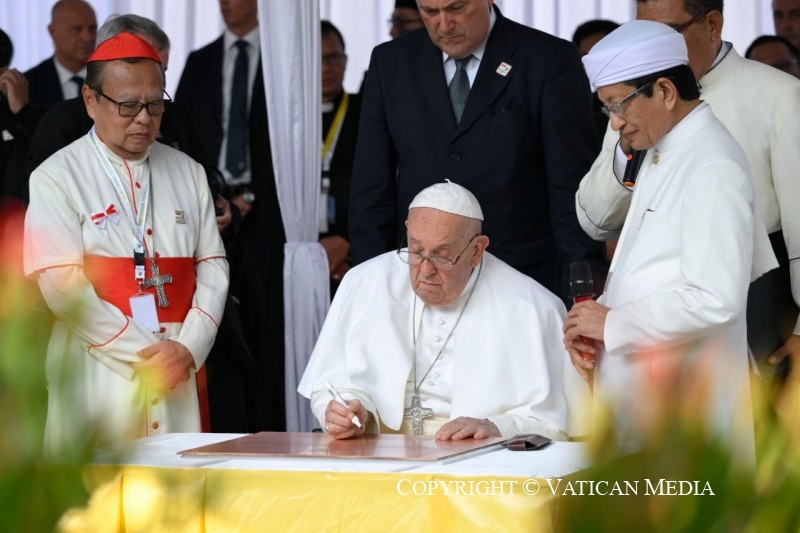Pope Francis and the Grand Imam: ‘Together against dehumanisation’.
The Istiqlal Declaration signed in Jakarta during the interreligious meeting. The invitation to believers to work together in the defence of the dignity of every person in conflicts and in the fight against climate change. Walking through the ‘tunnel of friendship’ between the mosque and the cathedral, the Pontiff invited people to ‘look in depth’ to seek what unites religions and to ‘cherish the bonds of friendship’ that make encounter in diversity possible.
Jakarta (AsiaNews) - The dehumanisation that in widespread conflicts causes ‘an alarming number of victims, especially women, children and the elderly’, while ‘the role of religion should include promoting and safeguarding the dignity of every human life’. And then the challenge of man's abuse of creation with ‘destructive consequences such as natural disasters, global warming and unpredictable weather conditions’.
These are the two areas of commitment contained in the ‘Istiqlal Joint Declaration “Promoting Religious Harmony for the Good of Humanity”’, the document signed this morning by Pope Francis and Grand Imam Nasaruddin Umar in the Istiqlal Mosque - the largest in South-East Asia - as part of the inter-religious meeting also attended by representatives of Indonesia's other religious communities.
A short text, in continuity with the Declaration on Human Fraternity signed by Pope Francis in Abu Dhabi during his 2019 trip, but one that places particular emphasis on two particularly painful wounds of our time: the increasingly widespread denial of the dignity of every person in the conflicts that stain the world with blood, and the destruction of the environment that shows no sign of stopping and whose consequences are increasingly evident in the Asia-Pacific region.
‘Since there is one global human family,’ the text reads, ’interreligious dialogue should be recognised as an effective tool for resolving local, regional and international conflicts, especially those caused by the abuse of religion. Moreover, our religious beliefs and rituals have a particular capacity to speak to the human heart and thus promote a deeper respect for human dignity'.
‘Recognising the vital need for a healthy, peaceful and harmonious atmosphere to authentically serve God and care for creation,’ the Declaration further reads, ’we sincerely call upon all people of goodwill to act decisively to preserve the integrity of the ecosystem and its resources inherited from previous generations, which we hope to pass on to our children and grandchildren.
At the Istiqlal mosque, Pope Francis had arrived by walking through the ‘tunnel of friendship’, the thirty-metre underground passage that connects the Catholic Cathedral of Our Lady of the Assumption to the large Muslim place of worship, in the central Merdeka Square. Welcomed by Imam Nasaruddin Umar, the pontiff stressed the uniqueness of this sign. ‘If we think of a tunnel,’ he said, ’we easily imagine a dark path that, especially if we are alone, can frighten us. Here, instead, it is different, because everything is illuminated. I would like to tell you, however, that you are the light that illuminates it, with your friendship, the harmony you cultivate, the support you give each other, and with your walking together that leads you, at the end of the road, towards the full light'. And it is a role that all believers, of whatever religious tradition, are called to play in these dark times marked by so many threats: to help us walk with our gaze turned towards the light, to ‘recognise, in those who have walked beside us, a brother, a sister, with whom to share life and support one another’.
From the sign represented by the tunnel, Francis also invited us to grasp two other lessons. The first: to always look in depth, ‘because only there can one find what unites beyond differences’. Because ‘the visible aspects of religions - rites, practices and so on - are a traditional heritage that must be protected and respected; but what lies “underneath”, we could say the root common to all religious sensibilities is one: the search for an encounter with the divine, the thirst for the infinite that the Most High has placed in our hearts, the search for a greater joy and a life stronger than any death, which animates the journey of our life and pushes us to come out of our ego to go to meet God’. ‘Looking in depth,’ he added, “we discover that we are all brothers, all pilgrims, all on the way to God, beyond what differentiates us”.
The other invitation was to take care of the bonds. ‘Sometimes we think that the encounter between religions is a matter of seeking at all costs commonalities between different doctrines and religious professions,’ Pope Francis commented. But this ends up ‘dividing us, because the doctrines and dogmas of each religious experience are different. What really brings us closer is to create a connection between our differences, to take care to cultivate bonds of friendship, of attention, of reciprocity’.
‘They are relationships in which each one is open to the other,’ he went on to explain, ’in which we commit ourselves to seek the truth together, learning from the religious tradition of the other, to meet each other's human and spiritual needs. These are bonds that allow us to work together, to march together in pursuit of some goal, in the defence of human dignity, in the fight against poverty, in the promotion of peace. Unity is born from personal bonds of friendship, from mutual respect, from the mutual defence of the spaces and ideas of others. May you always cherish this'.







.png)










